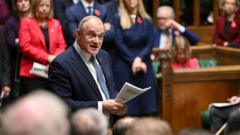Can Davey Collaborate with Government on Electoral Reform?

Published: 2025-11-07 07:00:32 | Category: technology
Sir Ed Davey, the leader of the Liberal Democrats, has indicated his party's willingness to collaborate with the government to transition away from the current first-past-the-post (FPTP) electoral system towards a more proportional representation model. This shift is seen as crucial to ensure that electoral outcomes more accurately reflect the diverse voting preferences of the British electorate.
Last updated: 30 October 2023 (BST)
What’s happening now
As discussions around electoral reform gain momentum, Sir Ed Davey's comments signal a renewed push from the Liberal Democrats to reform the electoral system. This comes against a backdrop where concerns about the legitimacy of the current FPTP system are being voiced more strongly, particularly due to the potential rise of Reform UK, a party that could leverage the existing system to gain disproportionate power in Parliament.
Key takeaways
- Sir Ed Davey advocates for proportional representation to replace the FPTP system.
- Prime Minister Sir Keir Starmer has previously shown support for reform but has not included it in recent Labour manifestos.
- The issue is gaining traction amid fears that Reform UK could secure a majority with a small percentage of the vote.
Timeline: how we got here
The debate around electoral reform in the UK has a long history, with key moments including:
- February 2020: Sir Keir Starmer pledges to consult on electoral reform within the Labour Party.
- December 2022: Sarah Olney introduces a Ten Minute Rule Bill for proportional representation, which passes its first parliamentary stage.
- 2024: Labour wins a landslide victory but fails to include electoral reform in their manifesto.
What’s new vs what’s known
New today/this week
Sir Ed Davey's recent statements underscore the urgency of the electoral reform debate, particularly with the potential of Reform UK becoming a significant player in Parliament. His willingness to work with the government demonstrates a strategic shift in how the Liberal Democrats might influence policy.
What was already established
The Liberal Democrats have consistently advocated for electoral reform, believing that the current FPTP system leads to significant voter disenfranchisement. Starmer's initial commitment to reform has waned, raising questions about Labour's stance moving forward.
Impact for the UK
Consumers and households
For the average voter, the shift to a proportional representation system could mean a more representative Parliament. This change may increase voter engagement as people feel their votes carry more weight in determining their representatives.
Businesses and jobs
Businesses may benefit from a more stable political environment, as a proportional representation system could lead to more coalition governments, reducing the risk of sudden policy shifts that can occur with strong majorities.
Policy and regulation
The Liberal Democrats' push for reform may lead to renewed discussions in Parliament, prompting debates on related topics such as constitutional change and civic engagement initiatives. The government’s response to these calls will be critical in determining the future of UK electoral policy.
Numbers that matter
- 72: The number of MPs the Liberal Democrats won under the current FPTP system in the last general election.
- 63%: The percentage of seats Labour secured in the House of Commons with only 34% of the popular vote during the 2024 election.
- 60%: The proportion of voters who felt unrepresented in Parliament following the last election.
Definitions and jargon buster
- First-past-the-post (FPTP): An electoral system where the candidate with the most votes in a constituency wins.
- Proportional representation: An electoral system that allocates seats based on the percentage of votes each party receives.
- Ten Minute Rule Bill: A type of bill introduced in Parliament that allows MPs to make a short speech in support of their proposed legislation.
How to think about the next steps
Near term (0–4 weeks)
In the coming weeks, discussions in Parliament may intensify as the Liberal Democrats seek to leverage public sentiment on electoral reform. Watch for any statements from Labour regarding their position on reform.
Medium term (1–6 months)
As the political landscape evolves, particularly with the potential rise of Reform UK, parties may reassess their strategies. Expect more robust debates on electoral reform and potential votes on related motions.
Signals to watch
- Public opinion polls regarding support for electoral reform.
- Statements from party leaders, especially regarding Labour's stance on the issue.
- Any proposed bills in Parliament related to electoral reform.
Practical guidance
Do
- Stay informed about changes in party positions regarding electoral reform.
- Engage in discussions about the importance of representation in democracy.
- Follow local and national elections closely to understand their impacts.
Don’t
- Assume that electoral reform is a settled issue; it remains contentious.
- Ignore the implications of government composition and electoral outcomes.
- Dismiss the voices advocating for change as mere political rhetoric.
Checklist
- Understand the current electoral system and its implications.
- Research different forms of proportional representation.
- Monitor upcoming elections and party manifestos for reform proposals.
- Engage with local representatives to express views on electoral reform.
Risks, caveats, and uncertainties
While there is a growing consensus on the need for electoral reform, significant uncertainties remain. The political will among the major parties is crucial, and without clear commitments, the push for change may falter. Furthermore, public opinion can shift, and what seems like a pressing issue today may lose urgency in the months ahead.
Bottom line
The push for electoral reform in the UK is gaining momentum, particularly from the Liberal Democrats, amid fears that the current system may lead to unrepresentative outcomes. As discussions continue, it remains essential for voters to stay engaged and informed about the implications of potential changes to the electoral landscape.
FAQs
What is the current electoral system in the UK?
The current electoral system in the UK is the first-past-the-post (FPTP) system, where the candidate with the most votes in a constituency wins.
What is proportional representation?
Proportional representation is an electoral system that allocates seats in Parliament based on the percentage of votes each party receives, aiming for a more accurate reflection of voter preferences.
What are the main arguments for electoral reform?
Advocates argue that electoral reform would increase voter representation, reduce disenfranchisement, and lead to a more representative Parliament overall.



